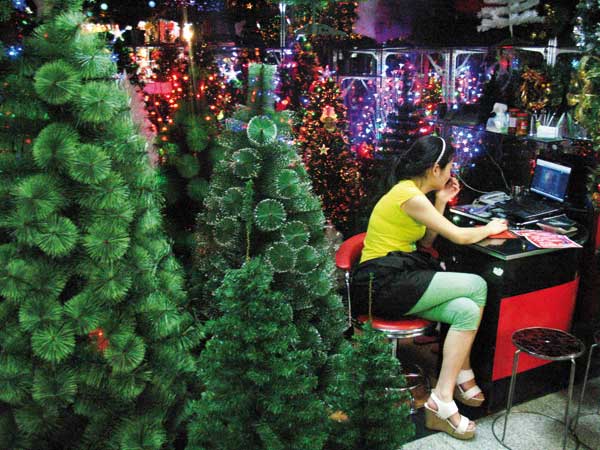 |
|
An owner of a company waiting for customers at her shop. Lin Jing / China Daily |
Demanding customers
The drop in orders this year has brought about some changes to business in Yiwu.
He Huaming, 53, owner of Yiwu Shenghua Handicraft Product Co, said that this year most of the clients have higher requirements for packaging.
"This year they ask for better and more exquisite packaging to attract consumers in their countries," He said.
The company makes decorations such as balls and bells for Christmas trees. He said that some old clients did not show up this year, while others just cut their budget by about one-third even as products with lower price tags notched better sales. "For instance, previously we had a box with six balls. But now clients prefer smaller packs with four balls. Some others choose to buy a box with six smaller balls."
Lu Xiaofeng, owner of Yiwu Xibao Crafts Factory, said he will see a 20-30 percent dip in overall sales at his company this year.
The company mainly produces Christmas trees and 80 percent of its products are exported to South America and the balance sold in the domestic markets.
The bestsellers are Christmas trees that are 1.5 to 1.8 meters tall, mainly for home use. He said that due to the European debt crisis, low-end trees are now more in demand.
There are two types of trees in his store: luxurious and normal. The first type includes many entertaining functions, such as more flashing lights. With environment-friendly materials, these trees are priced at about 300 yuan to 500 yuan.
The normal tree costs about 30 yuan and is made of cheaper materials. The brightness of the trees is also different.
"Christmas trees for foreigners are like lanterns for the Chinese during Spring Festival. With a tight budget, it is obvious that clients will go for the cheaper ones."
Rising labor costs are another burden that companies are grappling with. Labor costs increased by 30 percent last year and raw material costs by 20 percent.
"A 10 percent annual salary increase is a must for us to retain talent," said Lu.
His company pays 2.2 million yuan in salaries to 40 workers every year, accounting for 30 percent of the total costs.
Lu said that the company is under great pressure, with rising labor costs and reduced orders. All he can do is to try to get more orders and come up with better marketing practices to tide over the situation.
